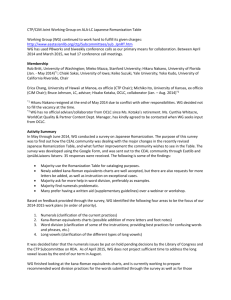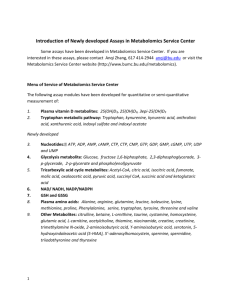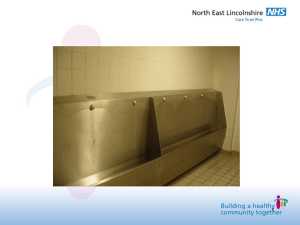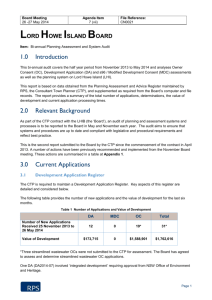Example CTP IEP Information
advertisement
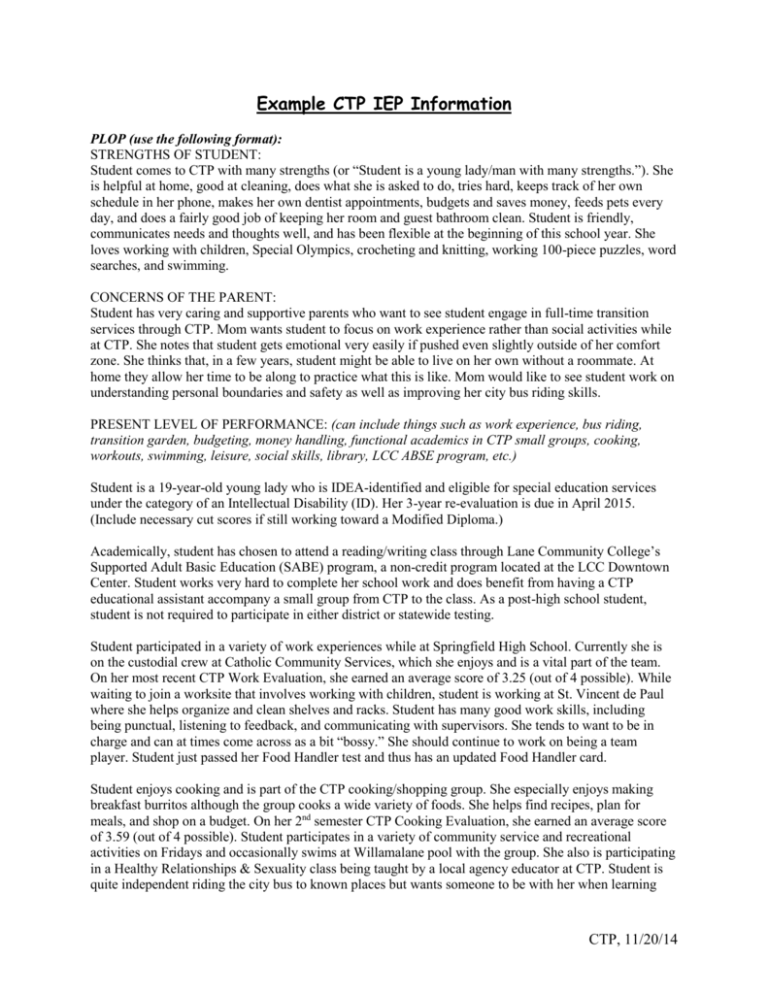
Example CTP IEP Information PLOP (use the following format): STRENGTHS OF STUDENT: Student comes to CTP with many strengths (or “Student is a young lady/man with many strengths.”). She is helpful at home, good at cleaning, does what she is asked to do, tries hard, keeps track of her own schedule in her phone, makes her own dentist appointments, budgets and saves money, feeds pets every day, and does a fairly good job of keeping her room and guest bathroom clean. Student is friendly, communicates needs and thoughts well, and has been flexible at the beginning of this school year. She loves working with children, Special Olympics, crocheting and knitting, working 100-piece puzzles, word searches, and swimming. CONCERNS OF THE PARENT: Student has very caring and supportive parents who want to see student engage in full-time transition services through CTP. Mom wants student to focus on work experience rather than social activities while at CTP. She notes that student gets emotional very easily if pushed even slightly outside of her comfort zone. She thinks that, in a few years, student might be able to live on her own without a roommate. At home they allow her time to be along to practice what this is like. Mom would like to see student work on understanding personal boundaries and safety as well as improving her city bus riding skills. PRESENT LEVEL OF PERFORMANCE: (can include things such as work experience, bus riding, transition garden, budgeting, money handling, functional academics in CTP small groups, cooking, workouts, swimming, leisure, social skills, library, LCC ABSE program, etc.) Student is a 19-year-old young lady who is IDEA-identified and eligible for special education services under the category of an Intellectual Disability (ID). Her 3-year re-evaluation is due in April 2015. (Include necessary cut scores if still working toward a Modified Diploma.) Academically, student has chosen to attend a reading/writing class through Lane Community College’s Supported Adult Basic Education (SABE) program, a non-credit program located at the LCC Downtown Center. Student works very hard to complete her school work and does benefit from having a CTP educational assistant accompany a small group from CTP to the class. As a post-high school student, student is not required to participate in either district or statewide testing. Student participated in a variety of work experiences while at Springfield High School. Currently she is on the custodial crew at Catholic Community Services, which she enjoys and is a vital part of the team. On her most recent CTP Work Evaluation, she earned an average score of 3.25 (out of 4 possible). While waiting to join a worksite that involves working with children, student is working at St. Vincent de Paul where she helps organize and clean shelves and racks. Student has many good work skills, including being punctual, listening to feedback, and communicating with supervisors. She tends to want to be in charge and can at times come across as a bit “bossy.” She should continue to work on being a team player. Student just passed her Food Handler test and thus has an updated Food Handler card. Student enjoys cooking and is part of the CTP cooking/shopping group. She especially enjoys making breakfast burritos although the group cooks a wide variety of foods. She helps find recipes, plan for meals, and shop on a budget. On her 2nd semester CTP Cooking Evaluation, she earned an average score of 3.59 (out of 4 possible). Student participates in a variety of community service and recreational activities on Fridays and occasionally swims at Willamalane pool with the group. She also is participating in a Healthy Relationships & Sexuality class being taught by a local agency educator at CTP. Student is quite independent riding the city bus to known places but wants someone to be with her when learning CTP, 11/20/14 new routes. It usually only takes her a few times to learn the new routes. Student struggles with change and can get anxious and emotional when unexpected things occur. However, so far in CTP she has seemed confident and flexible. (Student receives ELL services in addition to her IEP services.) ADDITIONAL INFORMATION: Communication: CTP staff currently are able to address student’s speech and language needs through daily support activities that encourage appropriate functional communication skills. The Speech Language Pathologist can provide informal consultation and collaboration, as needed, to help design accommodations to address communication skill development. Student’s 2013-2014 transition goals are reflected in the annual goals section as well as in the transition plan section of this IEP. Because student will turn 21 in May, this is his last year to receive special education services through the district. PROGRESS IN GENERAL CURRICULUM: In order to meet the special needs she has due to her disability, student historically has been served in special classes within a regular school setting. However, her post-high school education will be/has been in a community-based program, the Community Transition Program (CTP). Being in CTP allows student to be in general settings with the general population throughout each day as she gains skills in the four areas of Transition: Work, Post-Secondary Education, Community Participation, and Independent Living. Student completed high school with a Certificate of Completion/Modified Diploma from Springfield High School in June 2013. If applicable, include rationale for less than full-day participation. Graduation Options/Transfer of Rights: **Date of graduation (from high school) **With alternate document (either Alt. Certificate or Modified Diploma) **Make sure both first and second transfer notice dates included & include my CTP-specific transfer notice at student’s first CTP IEP meeting Transition Planning: STUDENT PREFERENCES, NEEDS & INTERESTS: Student loves working with little children and would like a job where she can do just that. She also would like to work at a grocery store or mini-mart, such as Dari-Mart. She would like to be able to alternate days between her jobs. Student eventually wants to live independently in an apartment or duplex, possibly with a roommate, although she realizes that might be challenging for her to deal with differences between the two of them. She definitely wants to live somewhere that will allow pets because she wants to have a pet to keep her company. Student wants to get on a waiting list for independent housing, perhaps for Sheldon Village. Student is interested in continuing to participate in organized recreational activities after exiting CTP. RESULTS OF TRANSITION ASSESSMENTS: See above for student’s responses to an informal transition interview. MEASURABLE POST-SECONDARY GOALS: Training: Based on Jacob’s preferences as indicated through an informal transition interview, Jacob will continue to engage in stand-alone, community-based transition services by attending the Community Transition Program on a full-time daily basis and engaging in a variety of functional activities, including attending LCC ABSE classes, which will prepare him to work in a paid position helping others, will CTP, 11/20/14 prepare him eventually to live independently in an apartment with good security, and will prepare him to access positive social experiences. Education, Employment & Independent Living Skill: See above TRANSITION SERVICES: Courses: “No formal CTP courses” Coordinated Activities: Student will receive stand-alone transition services in the following areas: **Work Experience (currently Goodwill and the CTP Coffee Cart) **Community Inclusion (YMCA and other recreational sites, Friday activities, volunteer projects, city bus riding to/from community sites, accessing community service agencies, etc.) **Independent Living (cooking & shopping, work on money skills, gardening skills at the Transition Garden, socialization, personal care & hygiene) **Post-Secondary Education (currently taking Supported Adult Basic Education classes at the LCC Downtown Center to build upon functional math, reading and writing skills; or functional academics within CTP small groups) **ELL Services (working 1-on-1 with Mr. Dempsey, ELL teacher; or, taking ELL classes at LCC) AGENCY PARTICIPATION: May include DDS, Brokerage agencies, Vocational Rehabilitation, or others Student Needs: “Independent/Daily Living Skills;” Activities/Strategies: “Student receives brokerage services through Full Access Brokerage. She has a personal support worker, Connie, who does community activities with her.” Person/Agency Responsible: “Full Access Brokerage, Nancy Hafner, Case Manager;” Timeframe: “Lifetime services;” OTHER AGENCY INFORMATION: Student receives SSI and is a client of Developmental Disabilities Services and Full Access Brokerage. She will be referred to Vocational Rehabilitation toward the end of this school year by her CTP teacher. Special Factors: **If student does exhibit behavior that impedes learning, mark it & address this somehow in the IEP, preferably under Supplementary Aids/Services on Service Summary page (1-on-1 assistant; behavior plan; small group supervision; etc.). ** If student receives ELL services, mark limited language proficiency on Considerations page and indicate in PLOP that the student received ELL services. **If student has 82, can say yes to Language/Communication needs and address it in the PLOP somehow (receives daily help within social/community contexts, etc.). Speech-language specialist does not necessarily need to be involved, except for 3-year re-evaluations or if listed as consultation on Service Summary. State/District Testing: Usually this is not an issue (mark no on both), but if student has not graduated and is working toward a Modified Diploma, handle on an individual basis and include cut scores, etc. in PLOP. Annual Goals: Progress reported “with regular progress reports” by “progress reports” Anticipated dates: Progress Period 1: 01/30/2014; Progress Period 2: 06/11/2014 Category: Transition “Given a variety of hands-on community-based experiences, by September 2014 student will demonstrate a variety of work skills (or readiness) for part-time paid employment (or volunteer work experience) by CTP, 11/20/14 successfully completing work experience through CTP, as indicated by an average score of 3.5 or higher on CTP work evaluations.” “Given participation in shopping/cooking class at CTP, by September 2014 student will demonstrate health and shopping skills, food prep skills, cooking/baking skills, good manners, and kitchen clean-up skills as indicated by an average score of 3.5 or higher on her CTP Cooking Evaluation.” “Student will attend CTP activities 80% or more of the time and will call in when absent 100% of the time for at least one quarter by June 2013, as evidenced by the student check-in system and teacher observation.” “Given daily practice riding the city bus, by June 2014 student will know how to get to at least 5 new places independently as indicated by staff observation and student self-report.” “Given daily opportunity to do so, by October 2014 student will demonstrate personal responsibility by signing in and out on the CTP student attendance sheet without staff prompting on 100% of the days for two weeks in a row.” “Given the opportunity to take LCC ABSE classes, by May 2015 Chelsea will have completed two years (6 terms) of at least one class per term.” “Student will improve his use of “adult” appropriate communication skills at CTP by calling in when absent, conversing about his life goals, and using age appropriate vocabulary in four out of five observed opportunities by October 2014.” “Given participation in the CTP cooking group, by November 2014 student will learn to prepare three simple recipes with minimal staff prompting, based on staff observation.” “By June 2013, student will take care of his personal self-care needs with minimal prompting, as demonstrated by needing one or fewer daily prompts from staff while at school.” “Given regular participation in recreational activities with CTP, by February 2014 student will bring his own money and spend it independently (including handling the money to pay and keeping track of the money in his wallet) on those activities requiring a fee, based on staff observation.” “Given regular opportunities throughout the week, by October 2014 student will engage in physical activities, including swimming, walking using workout equipment, etc., at least three hours per week, as evidenced by the student check-in sheet and staff observation.” “Given monthly lessons on healthy relationships/boundaries as well as regular, in-context instruction from CTP staff, by September 2014 student will demonstrate appropriate and safe personal boundaries both with males and with strangers as indicated by staff observation.” Services Summary: *Note: Start date should be day after IEP and end date should be day before IEP due. SDI: Transition Services (1800 minutes per week [360/day] is full-time); Tutoring—have to list math, reading, writing separately (120-300 minutes per week); Location=Community Related Services: Might include Transportation ESY: We do not do ESY with CTP students (unless very unique situation) Supplementary Aids/Services: Might include Behavior Plan (say “see attached behavior plan), 1-on-1 Assistant, Physical/Occupational Therapy CTP, 11/20/14 Supports for School Personnel: Might include Autism consultation or Speech/language consultation (60 min/yr) or, in case of tutoring, Consultation w/CTP teacher regarding tutoring subjects listed under SDI and for the purpose of determining any necessary accommodations, modifications, etc. to help student reach goals) Non-Participation Justification: No removal necessary Parent Statements: Check “Parent Rights” & “Consent for Vocational Activities in the Community” Cross off “parent” and write in “adult student” (unless has a guardian) Cross off K-18 and write in K-21 Adult student initials & signs where appropriate If not own guardian, parent/guardian initials/signs Placement Determination: DESCRIPTION OF OPTIONS CONSIDERED 1. Regular classroom with No Pull Out, Stand-alone, community-based transition program 2. Regular classroom with learning center supports BENEFITS: 1. Fulfills transition requirements of IDEA. Promotes the transfer and generalization skills for community success. Small group instruction. 2. Continue to work on academic skills in a more structured academic setting. POSSIBLE HARMFUL EFFECTS: 1. No harmful effects noted, or student must take city bus from Junction City to Springfield. 2. Does not promote the necessary transition/generalized skills for community success, larger groups. MODIFICATIONS/SUPPLEMENTARY AIDS AND SERVICES: 1. This is the least restrictive option. 2. The team considered student’s transition goals and needs when determining CTP as the most appropriate option. SELECTION/REJECTION: 1. Selected. The Community Transition Program (CTP) is the best place for student to work toward her transition goals. 2. Rejected. This placement does not meet student’s transition, social & educational needs at this time. PLACEMENT CODE: 80% or more of the day in regular class Prior Notice Form: **Note all changes to IEP (see sample) **Use Line 34 Ad hoc doc. Either “Provision of FAPE” or “Placement.” If student is a first year CTP student, could use “Placement,” but FAPE is fine, too. **Note reasoning if less than full-time in CTP. **Send one if student drops out of CTP or after 10-day drop. Indicate the student may continue to receive services if he decides to return and the district stands ready to serve. **Must send standard one with annual IEP if no changes to IEP. New Student/Out of District: **Follow Synergy checklist from Rhodora/Teresa CTP, 11/20/14

